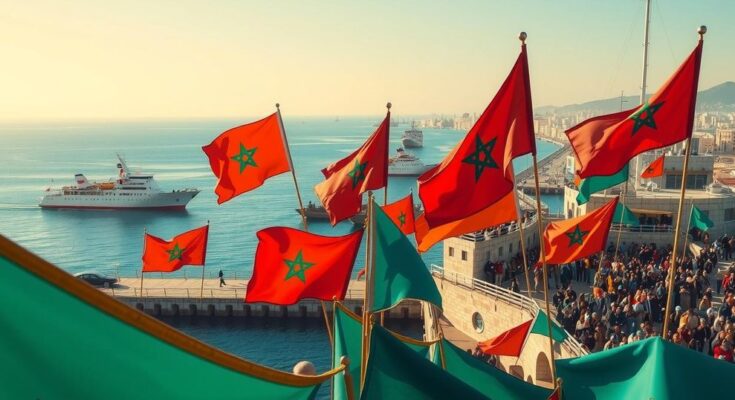Moroccan authorities recently blocked a protest against the Maersk vessel suspected of carrying F-35 parts to Israel. Demonstrators faced repression at police barricades while advocating for Palestinian rights. Activists highlighted the growing public dissent against Morocco’s normalization of relations with Israel amidst heightened military tensions. Further protests are planned in Tangier as the situation remains contentious.
On Friday evening, Moroccan authorities impeded a demonstration by pro-Palestine activists who were heading to the port of Casablanca. The gathering aimed to protest the docking of a Maersk vessel suspected of transporting components for F-35 fighter jets to Israel. Activists began assembling outside the train station and attempted to march towards the port, but were stopped by police at a secondary barricade.
Despite their peaceful intentions, protesters faced repulsion from security forces, although several dockworkers participated in a boycott of the ship as called by Morocco’s major labor unions, the UMT and CDT. The vessel in question, the Maersk Nexoe, is allegedly linked to a controversial transshipment of U.S. military equipment destined for Israel’s military operations.
Sion Asidon, a notable activist and leader within the Moroccan Boycott, Divestment, Sanctions movement, highlighted the increasing restrictions on protests in cities such as Agadir and Meknes, where efforts to stage similar demonstrations have been similarly thwarted. Police presence remained heavy, but the protest managed to last for over two hours.
Investigative reports indicate that Maersk may be facilitating the delivery of F-35 parts to Israel, with components purportedly shipped from Houston to Nevatim Air Base, a crucial site for Israeli air operations over Gaza. It was reported that another ship, the Maersk Detroit, is expected to dock in Tangier, further complicating the protestors’ efforts to prevent shipments associated with military activities.
Activists believe the Nexoe carries essential repair equipment for F-35s, reinforcing Israel’s military capabilities amidst ongoing conflict. Maersk has stated that the F-35 components are not intended for Israel, yet activists remain skeptical.
Demonstrators vocalized their demand for Moroccan authorities to adhere to public sentiment and take action against the vessel, framing their protest not only as a response to the situation in Gaza but also as solidarity with other regions affected by conflict. Public discontent regarding Morocco’s normalization policy with Israel has grown since the Gaza war commenced, with demands for the cessation of military and diplomatic ties.
Looking forward, protests are set to continue, particularly with Planned actions in Tangier where assets related to the ongoing conflict are expected to arrive. Unwavering opposition from Moroccan citizens exemplifies their commitment to calling for accountability and a reevaluation of Morocco’s relationship with Israel during this tumultuous period.
In conclusion, the protests against the Maersk ship’s reported cargo to Israel reflect the rising tensions concerning Morocco’s diplomatic ties with Israel amid the ongoing Gaza conflict. Activists have faced significant repression, yet they continue to demonstrate their commitment through peaceful protests. The situation remains fluid as demonstrations are scheduled to continue, underscoring a pivotal moment for Moroccan citizens demanding stronger action against complicity in foreign military operations.
Original Source: www.newarab.com




